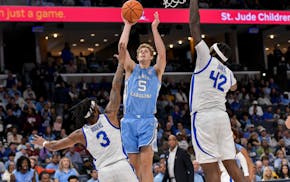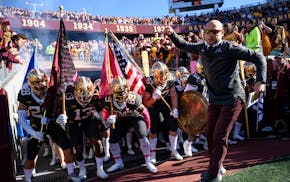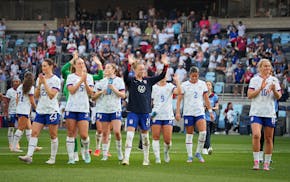Long before the U.S. women's national soccer team started making headlines this summer at the World Cup, two key members made a trip to Liberia, planting seeds for a dream that played out this week at the USA Cup in Blaine.
In 2016, U.S. coach Jill Ellis and goalkeeper Ashlyn Harris were visiting Monrovia Academy, an institution that aims to use soccer and education in creating the "future leaders" of Liberia.
For the young girls at Monrovia Academy, Ellis and Harris became instant role models, not some faraway celebrities. When the Americans made their World Cup championship run this summer, while fighting for equal pay, the Liberian girls watched intently, and with a purpose.
Now, thousands of miles from home and despite long odds, those same girls are blazing their own path. Monrovia Academy's under-15 girls' soccer team made history in Minnesota, marking the first time a Liberian female youth soccer team left the country for a tournament.
"These girls are seriously breaking down gender barriers," said Will Smith, Monrovia Academy's co-founder. "It's unbelievable what they're doing. They don't seem to be fazed by it, they just go and do their thing."
While Monrovia Academy itself aims for an equal split in genders, there was a special significance for the academy's first-ever trip to involve a youth girls' soccer team.
"I came here for a purpose," said Naomi Morris, one of 14 girls on the team.
In some parts of Liberia, a war-torn country where poverty and Ebola have taken a toll, soccer is often called "manball." From the name of the sport itself, Liberian girls and women face an uphill battle when it comes to gender equity.
For girls as young as those playing on this Monrovia team, they're also stuck either playing against boys or women far older than them. There's no in-between.
"They don't care about playing against boys; it doesn't make any difference to them," Smith said. "It's a pleasure to see these girls performing the way they are."
A path to the U.S.
Just a few months ago, getting Monrovia Academy to the United States seemed impossible. But during a phone call to Minnesota United CEO Chris Wright in early May, Smith floated the idea of bringing the girls stateside.
Smith didn't hear from Wright for two weeks. Then, suddenly, Wright returned with a surprise: Four of United's owners would fund the entire trip.
"It works with our why; it works with our purpose," Wright said. "If we want to do things inside this diverse community of which we live, this is the perfect example."
When Morris and the rest of the team were told they were going to America, the tears wouldn't stop falling. For the girls who could only fantasize about traveling outside the country, it was a major breakthrough. They never believed playing soccer could get them so far.
"It was my dream country," Morris said. "I really wished someday I would come here. So when I first was told [I was coming to the U.S.], I said, 'Wow, am I dreaming?' Now I'm not dreaming."
When the girls arrived, it wasn't just Minnesota United contributing. Such groups as OLM and African Girls Rock (AGR) helped mobilize the local Liberian community, lining the sidelines with supporters for the team's matches throughout the week. This turned every one of their goals into a jubilant celebration. And postgame, they blared traditional Liberian music and swarmed the team, dancing in a circle. The team is 4-0 and has reached the semifinals of its USA Cup bracket.
"What we're seeing on the pitch is something that we have not seen before," Liberian consulate Jackson George Jr. said. "Especially young Liberians from the homeland playing with the kind of professionalism that we see here. I'm very impressed."
New horizons
The girls' idols on the U.S. women's national team have helped shift how the average person views women's sports. With that team's influence still at a peak following the World Cup, girls like those of Monrovia Academy have their own outlet.
"They were coming [overseas from Liberia] at such a perfect time," said Patience Chowoe of AGR. "The U.S. women's soccer team winning, it gives girls around the world a voice to speak for themselves."
The trip to Minnesota was the end goal for Monrovia Academy, which was created in 2015 by Smith and co-founder Sekou Dgeorge Manubah. Their goal was to create a top educational and sports academy, where soccer is merely the "hook," as Smith put it.
"We felt the passion around football," Manubah said. "We were going to bring in the kids to educate them. It was a lot of excitement when we first started."
But they are just starting to expand now under the parent company, LEAD Africa. Next, they are opening another academy in Morocco, where they have already received hundreds of applicants.
From there, they are unsure of the specifics, but the expansion will continue throughout the continent. The objective remains unchanged, where soccer is merely a supplement to a quality education.
The goal moving forward, of course, is to re-create moments like this girls' team's trip, a journey of a lifetime."The real beauty of this trip is they're expanding their horizons," Smith said. "They're shifting their perspective. They're shifting their mind-set. I think the value of that is when they get back to Liberia, they'll view everything in front of them in a different light. They'll realize that basically anything is possible."

Gophers men's basketball team lands transfer Cade Tyson from North Carolina

Twins let another ninth-inning rally go to waste, lose to Mariners on walk-off single

Two offensive tackles, linebacker are first to commit to Gophers in 'Summer Splash' weekend

Twins' Correa ejected from on-deck circle, and he's not really sure why

